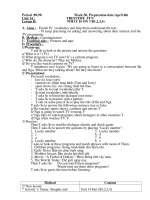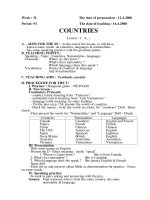Giao an 11cb(tiet43)
Bạn đang xem bản rút gọn của tài liệu. Xem và tải ngay bản đầy đủ của tài liệu tại đây (95.36 KB, 5 trang )
LESSON PLANS OF GRADE 11
Date: October 18
th
, 2008.
Period 43.
UNIT 7 : WORLD POPULATION
Lesson 2 : Speaking
I. Objectives:
By the end of the lesson, students will be able to give their opinion about the causes
and the problems facing over populous countries.
II. Teaching aids:
Textbook, chalks, boards, pictures…
III. Procedure:
1. Checking students’ attendance.
2. New lesson: Unit 7_ Speaking.
Stages / timing Teacher’s activities Students’ activities
Warm-up
(5’)
Pre-speaking
( 10’)
While-speaking
(20’)
_ Ask ss some questions.
+ How many children do your parents have?
+ Do you want to have more or fewer?
+ Do you know any families that have more than
10 children?
+ According to you, what are the causes to
population explosion?
_ Check ss’ answers and give feedback.
* Introduction:
“Today we are going to talk about the causes to
population explosion and try to find out the
solutions for this problem.”
_ Ask ss to read through the causes of population
explosion in Task 1 (page 83) and put them in
order of importance and explain the reason why.
_ Travel around the class and give some helps.
_ Let ss share their ideas.
_ Introduce how to give opinions of Task 1.
_ Check ss’ work and give feedback.
Task 2:
_ Explain how to do the task.
_ Ask ss to discuss in pairs and list the problems
facing the poor and over population countries by
combining the vocabulary in the useful language.
Example
+ Poor living condition.
+ Low living standard.
+ Not enough food.
+ Lack / shortage of school / hospital.
_ Let ss think of more problems to add to their
list.
_ Listen to teacher’s questions and
discuss to answer for each one.
_ Listen and write new lesson.
_ Practice reading the information of
task 1. Give out opinions.
_ Take note to give opinion for the task
1.
_ Listen and take notes.
_ Do the task in pairs.
_ Give ideas.
Presented by Khưu Chí Thành Thoi Quan High School
In my opinion, . . . . . . .
As for me, . . . . . . . . . .
As far as I’m concerned, . . . . . . . . . .
From my point, . . . . . . . .
It would seem / appear to me that . . . . . . .
LESSON PLANS OF GRADE 11
Post-speaking
(9’)
_ Ask ss to report the results.
Task 3:
_ Explain how to do the task.
_ Ask ss to work in groups of four to find out the
solutions. Using the suggested information of the
task.
_ Travel around the class to check ss’activity.
And give some helps.
_ Ask ss for their solutions.
_ Give comment and give feedback.
Task 4:
_ Ask ss to talk about the problems of over
population and offer solutions, using the results
of task 2 and 3.
_ Go around the class to give some helps.
_ Check ss’ reports and give feedback.
_ Listen and take notes.
_ Do the task in groups.
_ Share the ideas with partners.
_ Give out the solutions.
_ Practice to talk about the request of
task 4.
_ Talking to the whole class.
Homework:
_ Practice talking about the task 4 at home.
_ Write a paragraph about the problems and the solutions from task 4.
Date: October 18
th
, 2008.
Presented by Khưu Chí Thành Thoi Quan High School
LESSON PLANS OF GRADE 11
Period 44.
UNIT 7 : WORLD POPULATION
Lesson 3 : Listening
I. Objectives:
By the end of the lesson, students will be able to develope such listening micro-skills
as extensive listening for specific information and summarize while listening.
II. Teaching aids:
Textbook, chalks, boards, cassette player…
III. Procedure:
1. Checking students’ attendance.
2. Ask ss to talk about the task 4 of section “ Speaking”.
3. New lesson: Unit 7_ Listening.
Stages / timing Teacher’s activities Students’ activities
Pre-listening
(10’)
While-listening
( 20’)
* Questions:
+ Do you think that our world is over population?
+ What continent has the largest population?
_ Ask ss to discuss the questions and give out the
answers.
_ Check ss’ answers and give feedback.
* Vocabulary:
Latin America shortage
developing countries inexpensive
improvement rank
particularly generation
pusnishment
_ Help ss repeat all the words.
_ Explain difficult words.
_ Ask ss to read the statements of the task 1 and
guess for the answers.
Task 1:
_ Explain how to listen for the task.
_ Play the tape to help ss listen in twice or three
times.
_ Check ss’ answers.
_ Give feedback.
The answer keys:
1. A 2. D 3. C 4. D 5. A 6. C
Task 2:
_ Explain how to do the task.
_ Let ss read the questions and help them take
notes with the key words for each question.
_ Ask ss to listen again in two/ three times.
_ Ask ss to share their answers.
_ Ask them for the answers.
_ Check ss’ answers and give corrections.
Suggested answers:
_ Discuss to answer the questions.
_ Give out the answers after discussing.
_ Listen and repeat the words.
_ Read the statements and guess for the
answers.
_ Listen to teacher and take notes.
_ Listen to the tape.
_ Share the answers after listening.
_ Give out the answers.
_ Read the questions.
_ Listen and work in groups to answer.
_ Share the answers together after
listening.
_ Give out the answers.
Presented by Khưu Chí Thành Thoi Quan High School
LESSON PLANS OF GRADE 11
Post-listening
( 10’ )
_ Ask ss to discuss and give information based on
the cues given:
+ world population.
+ causes of the population explosion.
+ the problems it causes to the world.
+ particularly to the developing countries.
+ the solutions of the problems.
_ Ask ss for the report.
_ Check and give feedback.
_ Look at the correct answers, and take
notes.
_ Discuss in groups of four to talk
about the task.
_ Report to class.
HOMEWORK:
_ Practice talking about the task for post-listening.
_ Write a paragraph about the cues given of section “After You Listen.”
Presented by Khưu Chí Thành Thoi Quan High School
1. According to experts, by the year 2015, the
population of the world will be over 7 billion.
2. He said that the population growth rates in
some parts of the world are not the same. The
population grows more quickly in some parts
of the world than others.
3. According to experts, the reason for a fall
in death rates is the improvement of public
health services and medical care.
4. The problems (which) population explosion
causes to the world, particularly to developing
countries are shortage of food, lack of
hospitals and school, illiteracy, and foor
living condition.
5. The experts offered 4 solutions. They are :
(1) to educate people and make them aware of
the danger of having more children; (2) to
provide safe, inexpensive birth-control
methods; (3) to strictly implement a family
planning policy, and (4) to exercise strict and
fair reward and punishment policies.
LESSON PLANS OF GRADE 11
Presented by Khưu Chí Thành Thoi Quan High School
Unit 7: World Population
Tapescript
___oOo___
Interviewer: Good evening ladies and gentlemen. In our program tonight, we are
honoured to have Dr. Brown, a world famous population expert. Dr. Brown, could you tell
us something about the world population?
Dr. Brown: Well, there are over 6,700 million people in the world today, and the total
is increasing at the rate of about 76 millon a year. Experts say that the population of the
world could be over 7 billon by the year 2015.
Interviewer: Do all parts of the world have the same rate of population growth?
Dr. Brown: No, they don’t. The population is growing more quickly in some parts of
the world than others. Latin America ranks first, Africa second, and Asia third.
Interviewer: What is the main reason for the population explosion?
Dr. Brown: Well, I think the main reason is a fall in death rates. This is due to the
improvement of the living conditions and medical care.
Interviewer: I believe the explosion of population has caused many problems. Is it
right?
Dr. Brown: Yes, it is. It has caused a lot of problems such as shortage of food, lack of
hospitals and schools, illiteracy, and low living standards.
Interviewer: Can you make some suggestions on how to solve these problems?
Dr. Brown: I think, there are a number of solutions to the problems. The first is to
educate people and make them aware of the danger of having more children. The second is
to provide safe, inexpensive birth-control methods. The third is to strictly implement a
family planning policy. And the fourth is to exercise stict and fair reward and funishment
policies.
Interviewer: Thank you very much for being with us tonight, Dr. Brown.
Dr. Brown: You’re welcome.









